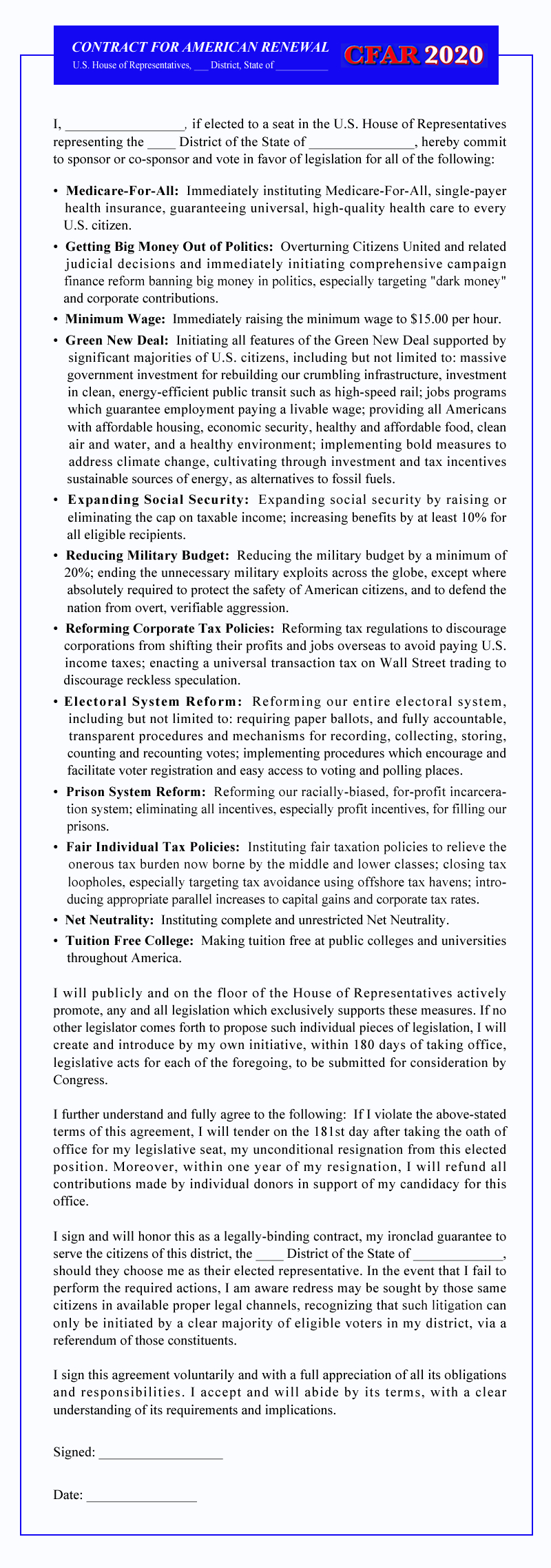 Asking our current political leadership to reform itself is like expecting a rabid dog to seek out medical treatment and find a path to full rehabilitation.
Asking our current political leadership to reform itself is like expecting a rabid dog to seek out medical treatment and find a path to full rehabilitation.
It’s quite obvious our “professional politicians” are now infected and controlled by an anti-democratic brain-eating virus, are well-compensated, septic purveyors of raging, exponentially-spreading corporate tyranny and ruling class oppression. This is a tenacious systemic disease which the brilliant political theorist Sheldon Wolin — who unfortunately passed away in 2015 — called inverted totalitarianism.
Which means if anything is to get done on behalf of the everyday citizens of this country, it will have to be initiated, engineered, and advanced by “outsiders” — that would be you and I, working with future political office holders who have not so far been and will not ever be sucked into the slipstream of the neoliberal, rapacious capitalism-at-all-costs juggernaut.
We must particularly remain keenly aware of and rigorously vigilant against spoilers in our midst. For example, we shouldn’t for a single, inattentive moment think we can count on any of the pseudo-progressives who are now, with the Trumpenstein monster’s ball in full swing, capitalizing on their resurgent popularity on dance cards of the desperate. There’s no question, we’re in big trouble. Our democracy is in the middle of an existential crisis. That hardly suggests we should turn to those who have been participating in, have often been instrumental in engineering the mess, to see what their latest bright ideas are.
Time for some new blood! Some fresh thinking!
We especially must not be fooled or sidetracked by what has been appropriately dubbed the McResistance, those who would lead a false challenge and short-lived charge against the current order, then in the end just cave to more crippling, insidious compromises on behalf of the ruling elite. We might not want to admit it but we do know who they are. They include such political rock stars as Elizabeth Warren and Bernie Sanders.
How, then, do we know who to trust? How can we determine who is merely engaged in another round of the tomfoolery that has destroyed our democracy, buried the American Dream under mountains of jingoistic puffery and comic book exceptionalism, gutted the hopes of everyday Americans, keeping them from participating in the enormous potential and opportunities which our country is supposed to represent for all its citizens?
There are times when ‘bold and simple’ are better than ‘nuanced and complicated’.
Yet, there is always a temptation to make something bold and simple more tentative and complicated than it needs to be. However, there’s no need here for wishy-washy thinking, waffling, Aristotelian cogitation, or utopian daydreaming. So . . .
Let me be clear about the purpose of the candidate contract strategy.
This might sound insultingly simplistic to some but I’m going to say it anyway.
The purpose of the candidate contract strategy is to get the good guys elected and throw the bad guys out of office.
Period!
And since in my view most of the current legislators and certainly the president falls into the ‘bad guys’ category, most of them should and — if the strategy is successful — will be replaced by a whole new freshman class of ‘good guys’. Yes, I’m talking about . . .
Regime change in Washington DC!
REQUIRED DEFINITIONS:
While the candidate contract strategy is certainly applicable at all levels of government for any position chosen by electors, ‘elected’ and ‘office’ for my immediate purposes refers to federal openings — membership in the House, membership in the Senate, the President.
A ‘good guy’ is an elected official who is honest, transparent, and wholly responsible for representing the needs and priorities of those constituents who by majority vote have chosen him/her as their congressman or president.
A ‘bad guy’ is an elected official who does not consistently and unwaveringly represent the needs and priorities of his/her constituents, probably is beholden to or strongly influenced by campaign donors, corporate lobbyists, well-funded special interest groups, in a phrase, ‘the ruling class’ of this country.
Having said that, let’s get down to the nuts and bolts of how the candidate strategy works.
BASIC BUT CRITICAL Q & A:
Q. Who would want to sign such a candidate contract?
A. Any candidate running for office who wants to get elected.
 Q. How can signing a candidate contract guarantee getting elected?
Q. How can signing a candidate contract guarantee getting elected?
A. Of course, there are no absolute guarantees. At the same time, please refer to the title of this article. If a candidate does not sign the contract, we don’t vote for him or her. If a candidate does sign the contract, he or she deserves, thus will get our votes. Of course, this means voters must unite and take a firm stand. But why wouldn’t they? It’s in all of our best interests and the best interests of our country as a whole to be strong and take back our democracy.
Q. Why is the proposed contract in our best interests?
A. The contract as offered, subject naturally to minor adjustments which reflect the specific needs and priorities of each voting jurisdiction, embraces those things which by huge majorities everyday citizens want done and aren’t getting done. Poll after poll shows support for all of the items which are addressed in the contract of 62% or more of everyday American citizens. Most of the initiatives are supported by more than 3/4 of those polled. The people have spoken. The contract just takes their concerns and priorities and puts it in writing.
Q. Why should the voting public demand candidate contracts?
A. Because at least on key issues which are important to the voting public, they take the guesswork out of voting. There is no ambiguity, room for negotiation, or even margin for error. The contract stipulates in no uncertain terms what an elected official must and will do on those key issues from the day he or she arrives in Washington DC. Voters are fed up with hot air campaign rhetoric and broken promises. In one master stroke, the contract gets rid of the smoke and breaks the mirrors.
Before we go on, let’s look at the contract I’m offering. This is the comprehensive catch-all version, based on critical issue polling and Bernie Sanders’ campaign platform.
 Now . . . back to the nuts-and-bolts.
Now . . . back to the nuts-and-bolts.
The candidate contract or contracts are initially introduced to the electoral process — a campaign for public office — from two directions, eventually to meet in the middle.
CANDIDATE CONTRACTS FROM THE PEOPLE:
A citizens group or citizens groups representing certain constituent causes can and should put up a candidate contract which reflects issues of concern, then present them to those candidates running for office in their district.
For example, minimum wage workers in a congressional district should challenge anyone running to sign a contract boosting the federal minimum wage. There already are many “FightFor15” activist groups around the country. The appropriate candidate contract turns their pleas into a concrete demand — a forceful, decisive ultimatum. If a candidate signs such a contract, he or she gets not only the endorsement of the group, but the members of the activist group take it upon themselves — after all it’s in their best interests — to actively and enthusiastically campaign on behalf of that candidate, reinforcing his/her own official publicity and whatever media coverage can be generated.
Senior citizens groups may likewise prepare a candidate contract to protect Social Security and Medicare. The candidate who signs such a contract again gets the full support and backing of such senior citizens groups. They highlight the candidate’s loyalty to them in all of their newsletters, at their shuffleboard club meets, bingo contests. They wear t-shirts or put bumper stickers on their cars and golf carts: Future congressman Godfrey Goodman signed on the dotted line to protect SS and Medicare!
CANDIDATE CONTRACTS BY NON-ESTABLISHMENT CANDIDATES:
At the other end of the equation, an independent or third-party candidate, or a candidate running as a dissident major party candidate, for example in a primary, would make the candidate contract central to his/her campaign. Based on research and polling in the local district, a contract which reflects the priorities of voters in that district would be drawn up, which highlights those key issues which have broad public support. Such a contract would look like the one above, making solid, unambiguous commitments on a range of popular, critical causes.
Now it’s important to understand, the establishment candidates may give lip-service to what’s in that contract or an appropriate variation of it. But the reality is, they will not sign it. They can’t! If they did, their major parties would abandon them, their campaign funding would dry up, they would be targeted — as Bernie Sanders was by the Democratic Party — for marginalization and defeat.
This makes the signed contract a huge public relations coup! It effectively gives the ‘good guy’ anti-establishment candidate the high ground, the right to legitimately say and be able to prove, he or she is on the side of the people. Putting the contract front and center in the campaign takes the guesswork out of the voting for the public. They can see in the starkest terms exactly where the candidates stand and who’s really on their side.
INTRODUCING HONESTY AND TRANSPARENCY INTO THE GAME:
I don’t know how to say this gently or with Zen dispassion. So . . .
The candidate is not a magic wand. It’s a sledgehammer!
Signing the contract will not create some harmonic convergence of metaphysical forces which will usher people into the voting booth and make them vote for a candidate.
Signing the contract does, however, provide a powerful tool to beat up an opponent and discredit a ‘bad guy’ candidate in the eyes of the voters, while portraying in stark relief the candidate who does sign the contract, as an individual who has volunteered a bulletproof guarantee, if elected, of service to his constituents.
This is no trivial matter.
Right now, campaigning is a house of mirrors in a bank of fog. Words are chosen with a lawyer’s eye and a Madison Avenue ear. I’m not sure the candidates typically even know themselves where they stand on much of what’s important to the public. But if they do, they sure aren’t telling us in clear, unambiguous terms. Thus expectations and performance are secondary to image and appeal. The same shallow devices, cynical psychology, and stealthy methodologies, are used to “sell” a candidate as are used to sell any other products out there, from eyeliner to soda pop and fast food to automobiles and fantasy vacation cruises.
The candidate contract puts back front and center what a political campaign should be — but rarely is — all about, which is what exactly can we expect the candidate to do once he or she arrives in Washington DC.
Having the candidate contract be the new standard for electoral integrity, particularly having it arrive simultaneously from the two critical participants in the voting mechanism — the advocacy groups among the voting public and enlightened candidates themselves — means it reflects the best traditions of the democratic process.
It represents a long-lost level of honesty and transparency, reintroduced into the requisite and most basic communication that is the foundation of a robust democratic system — the vetting process for identifying and selecting elected representatives.
The voters can and must probe the candidate: “Where do stand on this?”
And the ‘good guy’ candidate gets to reply: “Glad you asked. Just read my contract with you, the voters. It’s all spelled out in black-and-white. And yes, that’s my signature at the bottom.”
If we as voters and those among us who aspire to be elected representatives turn our backs on this idea, during such divisive and perilous times, when we’re starting to hear the initial portents of a death rattle from our sick and dying democracy, we will deserve the brutally totalitarian, crassly authoritarian, wantonly fascistic debacle our government-by-the-corporate-ruling-elite is fast becoming.
The time is right for candidate contracts.
Unless you have a better idea . . .



